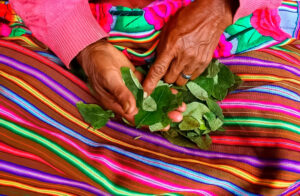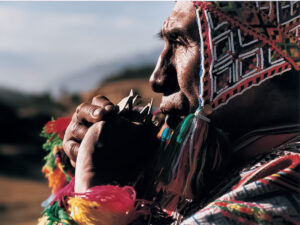Coca leaf in Cusco
Did you know?
Coca leaf reading, known in Cusco Quechua as kuka qhaway, in Ayacucho Quechua as qatipay and in Ancashino Quechua as katipa, is a divinatory practice in which the specialist uses the leaves of the coca plant (Erythroxylum coca) to make consultations, conversations and interpretations on various daily and spiritual aspects that impact the traditional communities of the Andes.
|
The coca leaf played a fundamental role in Andean culture and was crucial in social, mystical and religious events. During the Inca Empire, the Incas considered it a divine plant, reserving its cultivation exclusively for the state.
This control allowed the production to be used for religious celebrations such as “Inti Raymi”, dedicated to the sun. In addition, the coca reading ceremony, which originated in Inca times, was used by priests to foresee the future and guide decisions that ensured the well-being of the Ayllu.
In the Inca empire, the Cocapirikuy was a priest specialized in predicting the destiny of the empire.
This priest threw coca leaves on a mantle, and the figures they formed when they fell were interpreted to foresee the future of the communities or their rulers. The reading of these leaves served as a form of connection with the divine, always seeking the best path for the people.
It was considered a plant of exclusive and restricted use in the Inca empire.
Only the people could access it with the authorization of the authorities, and its use was limited to ritual and ceremonial practices. The rulers gave their servants a quantity of coca leaves as a sign of gratitude, recognizing their service.
Thus, the Cocapirikuy not only fulfilled a spiritual function, but also acted as a mediator between the divine will and the political decisions that governed the empire.
What is coca leaf
The coca leaf, native to South America, particularly the Andes, has the scientific name Erythroxylum coca. Coca is a plant rich in essential nutrients, minerals, essential oils, and pharmacological compounds.
The coca plant can reach a height of approximately 2.5 meters. Its flowers are white, and its leaves are oval-shaped.
Coca leaf has a long history of use, with evidence of its use in pre-Inca cultures over 8,000 years ago.
Incas used its anesthetic properties to combat fatigue and reduce stress, making it an essential tool for their physical and mental well-being.

The Meaning of Kintu in the Andean Worldview
The term Kintu comes from Quechua and refers to a "group of three coca leaves," which are used in rituals to establish a connection with the spiritual world. In some regions, it is also known as quintu or khintu.
- In Andean tradition, Kintu is considered a sacred practice of gratitude to the gods of the Andes and nature.
- Symbolic meaning: it represents harmony, the fusion of spiritual energies, and universal balance.
- Application in ceremonies: it is used in rituals as offerings to Pachamama, in celebrations, and in daily life, to ask for protection and blessings.
Elements for Coca Leaf Reading and Their Meaning
- Coca: Coca, like other plants such as ayahuasca (Banisteriopsis caapi) or San Pedro (Echinopsis pachanoi), is considered a master plant in traditional medicine. It possesses a spirit known as Mamacoca, who has the ability to communicate and transmit teachings to healers. Furthermore, Mamacoca acts as a mediator between human beings and other forms of existence, facilitating this connection through offerings. For this reason, the coca leaves used in the reading are previously chosen by the reader.
- Reader: The person in charge of reading the coca leaves in Andean culture was known as the Cocapirikuy.
- The Blanket: Ideally, an unqhuña (a small traditional blanket) is used, on which the person in charge of reading the leaves. If an unqhuña is not available, a handwoven blanket or poncho is used to perform the ritual.
- Additional elements include: Florida water, candles, a bell, pututo, coins, etc.

How is a coca leaf reading performed?
- First, the reader spreads the coca leaves on the unqhuña blanket.
- Before beginning, they place the leaves inside the blanket and cover them.
- Then, they say a prayer to ask permission from the Mamacoca, seeking her blessing to access the oracle.
- Afterward, they make a sign in the shape of a cross, indicating the four cardinal points with their hand and the bell.
- Once the oracle is opened, the assistant places a coin next to the leaves, forming the "mesada."
- Afterward, the prediction begins for each participant.
Methods of Use
- First, coca is used to make offerings.
- Second, the Incas chewed coca leaves to reduce hunger, fatigue, and sadness. They considered the plant sacred, so they offered it to the gods and important warriors.
- Third, it is prepared as a tea to take advantage of its healing properties.
- Fourth, it was used as a local anesthetic.
- Finally, it helps prevent altitude sickness (soroche).
Why the price?
At Ayahuasca Retreat Cusco, we provide quality service, guided by experienced shamans. We ensure that each of our participants is in a safe and welcoming environment throughout the entire process. Furthermore, we have all the necessary and appropriate equipment to properly perform the coca reading, ensuring a complete and profound experience.
What are the benefits of the coca leaf?
The coca leaf offers various physical and spiritual benefits. It helps relieve fatigue and improves mood, as well as boosting physical and mental performance, reducing stress.
It also has medicinal properties, such as relieving altitude sickness and digestive problems, and is used as a local anesthetic in traditional practices. Furthermore, it has a deep spiritual significance, serving as a means of connecting with the divine through its use in rituals and leaf reading.
What is kintu?
The term kintu refers to a "group of three coca leaves," which are used in rituals to establish a connection with the spiritual world. In some regions, it is also known as quintu or khintu.
Is coca leaf the same as cocaine?
No, coca leaf is not the same as cocaine. Coca leaf is a natural product, and its traditional use is for medicinal and spiritual purposes.
Cocaine, on the other hand, is a concentrated and processed alkaloid that has psychoactive effects and can be very harmful when consumed illegally.




